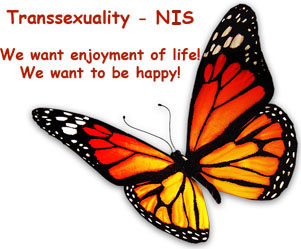Sexuality...
or the most beautiful thing in the world. ![]()
At this point I would like to deal with a topic that is still fraught with ignorance, stigma, shame and prejudice. Especially before and at the beginning of transition, the topic is generously avoided by almost all transsexual victims (NIBD). Although people suffering from NIBD, they are also sexual beings and endowed with a sex drive, the sex drive is not granted in terms of interaction with other people. The reasons are obvious. On the one hand, in transsexual women (NIBD) who take a blocker until the testicles are removed to stop the testosterone effects (endocrinologists usually prescribe Androcur), the sex drive comes to a standstill. On the other hand, with an anatomy whose external appearance does not correspond to the inherent sexuality and thus the innate sexual being, a pleasurable and satisfying sexuality with a sexual partner is not possible. Although the masturbation is quite feasible with some compromises, but not fulfilling. A (former) transsexual man wants to give and a (former) transsexual woman wants to receive. With the wrong genital equipment, the whole thing is just not feasible. This fact also contributes to the considerable suffering. The transition is certainly not primarily carried out for sexual reasons or even sexual preferences, since completely different causes play a much larger and more decisive role, but the topic cannot be neglected, because it is precisely a healthy and intact sexuality that can be lived out , is the icing on the cake, which contributes to a complete arrival after completion of the transition.
Or as a friend of mine once said:
At the latest then "Trans" is a final and completely closed phase, if after the physical-anatomical coherence also the holistic psycho-social supplement of THESE!!! conditions could be achieved!
Another reason to avoid the topic of sexuality is how many reviewers deal with it. How often have you heard both versions:
- Yes, if you have not yet had sex, then you can't judge whether you are transsexual ...
- Yes, if you have already had sex with the current organ, then it can't have been that bad for you, so you are certainly not transsexual (at most transgender).
As you can see, no matter what you say, a rope is twisted out of it. So it is best not to speak to them about this topic. The most famous question of all questions is still missing, especially in German usage:
If transsexuality (NGS) has primarily nothing to do with sexuality, why is it still called transsexuality? I think that's a legitimate question. The answer is also very easy! Quite simply, the word component "sexuality" in transsexuality does not describe "bed stories" but rather the "inherent sexuality of a person". And in English, "inherent sexuality of a person" simply means sex. It's in every passport where the "Geschlecht" (German) / sex (English) / sexe (French) as f (female / féminine - female) or m (male / masculin - male) is coded.

This would also clarify the question of the term "transsexuality". Incidentally, to the great contrast of "transgender", because "gender" is the social gender role in German. So practically socio-gender behavior, which is by no means an indication of whether who is sexually a man or a woman. (There is enough on the subject of transgenderism elsewhere.)
Unfortunately there are still a lot of people from yesterday who don't care about the linguistic facts and origins, it says "sexuality", so it must have something to do with homosexuality, sexual preferences and "bed stories". And since sexuality and thus also sexual intercourse is seen by a great amount of people and in many cultures as something dirty and perverse and is associated with a lot of shame, it may only be used after marriage and to make babies, transsexual people (NIBD) are also immediately pushed into the perverse or even into the red light corner. I don't need to explain in more detail that this is doing more than injustice to those affected by NIBD.
Be that as it may, a generally more relaxed and casual approach to human sexuality, free from shame, stigma and prejudice but with the necessary respect and decency would do us all good.. ![]()


